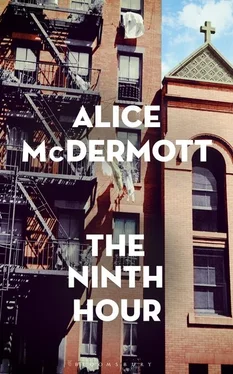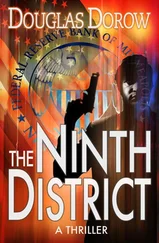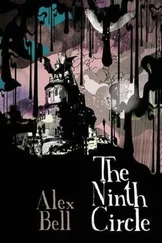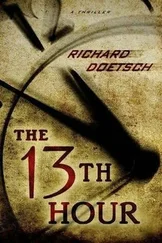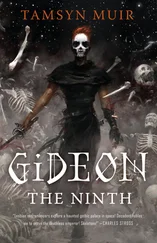A woman who had already been greeted rose into the aisle to wait for the station ahead. Michael Tierney touched his hat to her again, and she beamed at the two of them. She was not a young woman, but she wore a pale spring suit and a summer fur and there was a gold bracelet over the wrist of the gloved hand that gripped the back of the seat in front of them. “Is this your son?” she asked, and his father said, laughing, “I stand accused.”
“He’s very handsome,” she said, and his father looked at him and feigned a start. “Is he?”
The train was coming into the station. “You are a very handsome pair,” the woman said, her eyes all on his father. Once more his father raised his hat as she left them, smiling, for the door. Father and son exchanged a look of chagrin, and then his father, dear man, put out his hand and patted the boy’s knee. There wasn’t a chance, they both knew, that an estrangement of any sort would ever drive them apart.
The station at Poughkeepsie bustled somewhat more than the others, but it was a country station nonetheless. His father knew the way. It was a small brick church, already filling up with what appeared to be the town’s oldest citizens. Gray-haired men and stooped women in floor-sweeping skirts. The mothball scent of hibernation all about their clothes. The pallbearers—the coffin was a gleaming mahogany—seemed the youngest of the attendees, but even they were thick about the middle. Patrick heard their straining breaths as they carried the coffin down the aisle. They were followed by only two mourners. One was a tiny woman smiling like a bride behind her black veil, and beside her, walking slowly, with practiced patience, a one-legged man who leaned on a crutch, the sleeve of his missing arm pinned neatly against his shoulder. His hair was the pale orange of an ancient redhead, with a streak of pure white on the right side, above a gnarled patch of silver scar tissue, the twisted remains of an ear.
“Aunt Rose,” his father whispered from behind him. “My father’s sister. And Red Whelan. My father’s substitute in the war.”
After the funeral mass, a flushed and heavy man, a friend of his father’s youth, recognized him in the milling crowd. He offered them a ride to the cemetery in an open car that was an adventure for Patrick since there was no need to own a car in Brooklyn. Patrick, in the back seat, stretched himself along the leather upholstery. The day was brighter still, growing warm, the green landscape, lawns and fields and budding trees, was luxuriant, wide open, a painted stage set to his city eyes: there was a simple red barn, comical black-and-white cows, a cartoon silo. Over the whir of the engine and the jostle of the springs, he heard his father say, “And I see old Red is still with us.” The friend wore a straw boater, much like Patrick’s own. “A tough bird,” the man cried. “But no tougher than Rose. Still his caretaker.”
His father turned to shout into the backseat. “Red Whelan,” he began, but the car swerved a bit, avoiding a hole in the road, and an impatience passed over his father’s face, as brief as passing sunlight. He began again, “Red Whelan is the man who served in the Union Army so my father didn’t have to. Saved my old man’s skin. Made it possible for me to be born.”
The friend behind the wheel shouted a laugh at this, and then nodded, as if the connection had taken him by surprise. “Isn’t that the truth?” he said. And added, more solemnly, “No truer words,” as if to amend his surprise.
Michael Tierney threw an arm over the backrest, so he could get a better look at his son, lounging as he was in the wide backseat of the jaunty car. He aimed a finger at the boy’s chest, added, “Which means Red Whelan made it possible for you to be born, too.”
Patrick sat up straight, as if in response to a reprimand. But the landscape was not a serious landscape, it was full of broad greens and bright blues and clichéd farmsteads. The car puttered and squeaked like something in a circus. The scenery, this talk of the past, the day itself, was straight from the funny papers. He took none of it seriously.
The stout friend was shouting back to him, eyes on the rearview mirror. “Think of that, my boy. You might never have been. You!” he called out. “The first-born son.” Patrick resisted the impulse to correct him: Tom was the first-born. “The finest fruit of Red’s sacrifice,” he went on, enjoying himself. “You. A barefoot boy with cheeks of tan. Here only by the grace of old Red Whelan.”
That shadow of impatience passed over his father’s features once again. He was, perhaps, remembering how little he liked this old friend. “Nothing is certain,” he said, sober and annoyed. “My father might well have survived the war unscathed if he’d gone. If Red Whelan hadn’t replaced him, he might have survived nonetheless. No one knows.” He turned to face the windshield again, and then, after a few moments of consideration, turned to his son once more. “Although I suppose you should thank the man,” his father said. “If you get the chance.”
At the gravesite, Red Whelan was already seated, so old and thin he looked sunk into his clothes. His uniform. In the sunlight, Patrick now noticed the faded stripe on his one outstretched leg. Sunlight caught as well the golden buttons on his jacket and a medal on his chest. With his broad face and his thick hair, his skull at the top of his narrow shoulders seemed as big and as buoyant as an outsized balloon. Seemed, in fact, to lift him out of the chair when the service was ended and the casket—no flag because it was Red Whelan who had served—was lowered into the freshly dug earth. But in fact it was the little woman, his father’s Aunt Rose, who got him standing, got him steady on his crutch, even in the soft uneven grass. Even though, despite how stooped he was, she came only to his shoulder. His caretaker.
Driving back to town, the friend of his father’s youth was full of regret—he clucked his tongue at every other sentence—for the lost years of their acquaintance, for the lost time of their boyhoods together. Without inquiring about their plans, he drove Patrick and his father to the house in Poughkeepsie for the luncheon. It was a pretty house, narrow and tall, brick-red shingles and white trim. A small front porch, a spreading oak, fading daffodils with their heads bent in the front yard, and a not-yet-blossomed row of lilacs along the side, under a bowed picture window hung with lace.
The funeral guests were parking their cars all up and down the shaded street or walking along the sidewalk, as father and son and the clucking friend made their way up the flagstone path. As they reached the painted steps, the black funeral car pulled into the rutted drive and stopped. The driver stepped out to open the door for Aunt Rose, and then she, in turn, put out a hand for Red Whelan. Together the two slowly crossed the lawn. His father’s friend, greeting them, said, “Miss Tierney, Red,” and then stepped back to show them Patrick.
The boy swept off the straw boater and placed it over his heart, waiting to be introduced to this frail man who had once been a soldier. But no one said a word. His father had moved away, was already up the steps, standing at the front door, with his own hat against his chest. He had opened the door for them and was standing, waiting, holding back the screen. The corpulent friend of his youth was chuckling, but so quietly, so deeply in his throat, that the sound seemed to come from something nattering in the trees.
Aunt Rose smiled, her hand on Red Whelan’s arm. Only her teeth and her eyes shone behind the black netting of her veil. With no introductions made, Patrick said, “How do you do?”
Red Whelan was concentrating on the slow movement of his crutch as he lifted it from the grass of the lawn to the blue slate of the walkway. This close to the man, Patrick saw that the injury that had plowed his flesh, taken his ear, turned his hair all white on one side, seemed only a part of the general redness nature had given his skin, the general havoc that time had played with his ravaged old face and neck and single, skeletal hand.
Читать дальше
